Christianity and the Civil War - 1
Chris Knepp
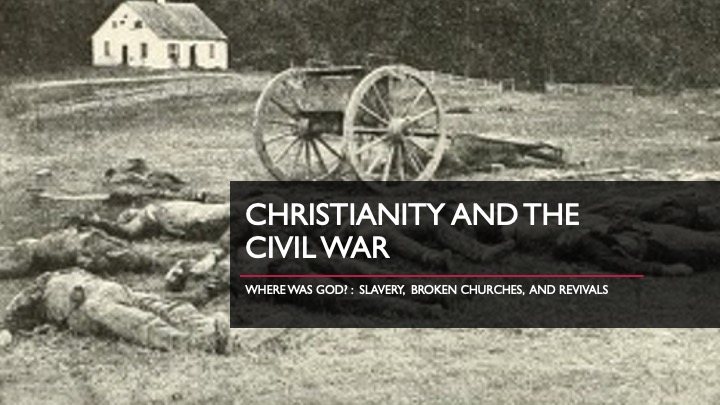
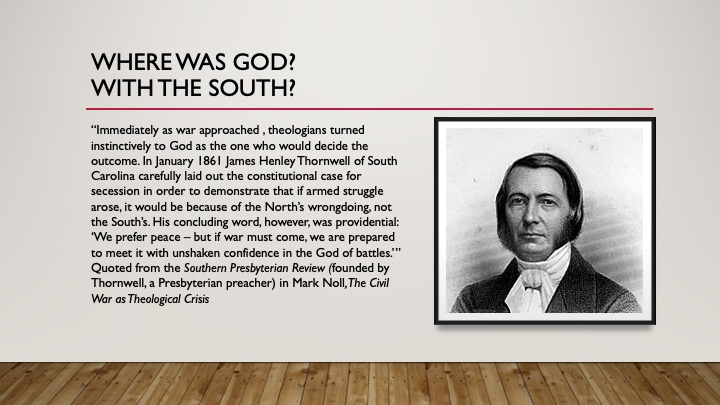
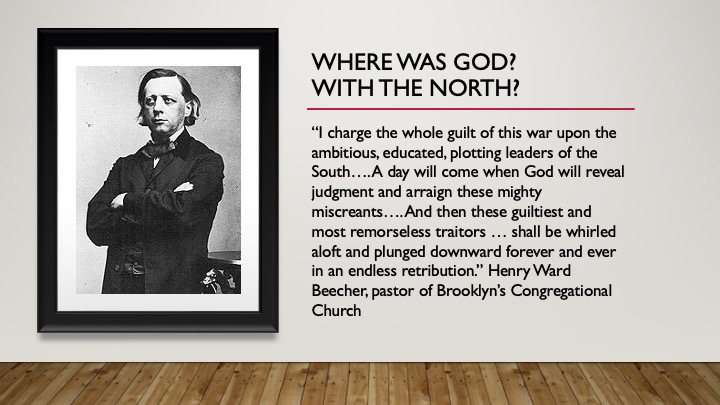
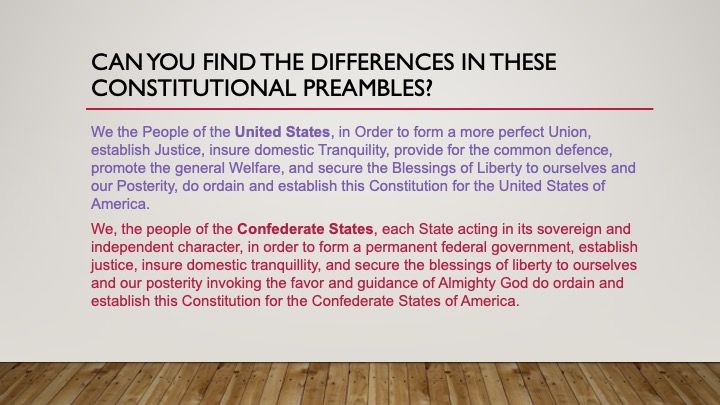
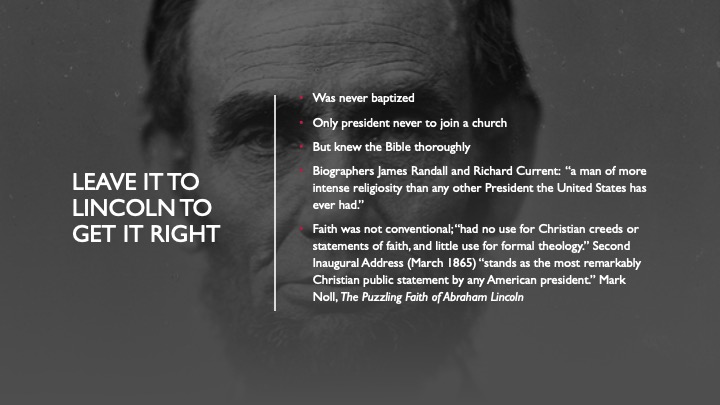
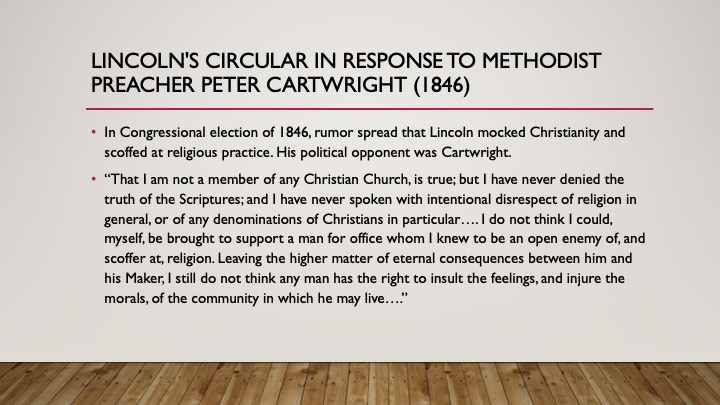
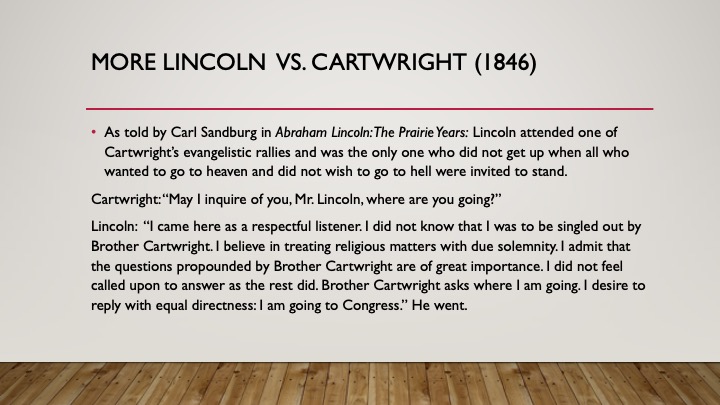
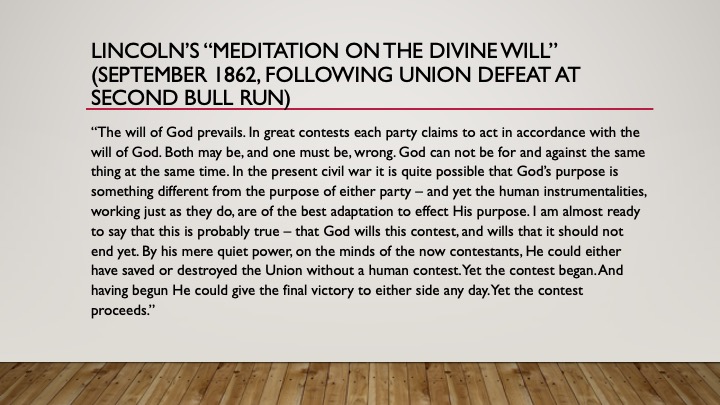
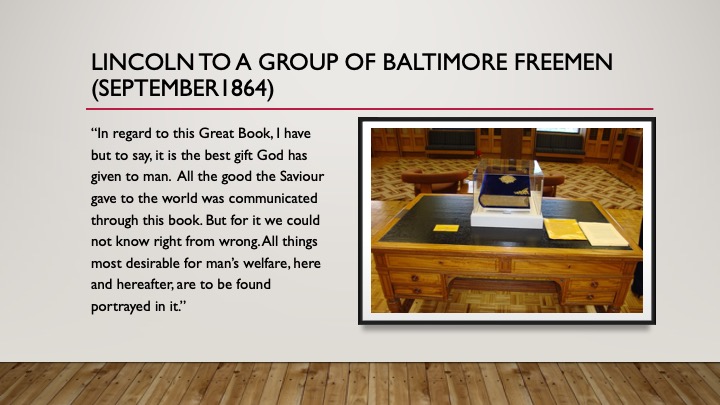
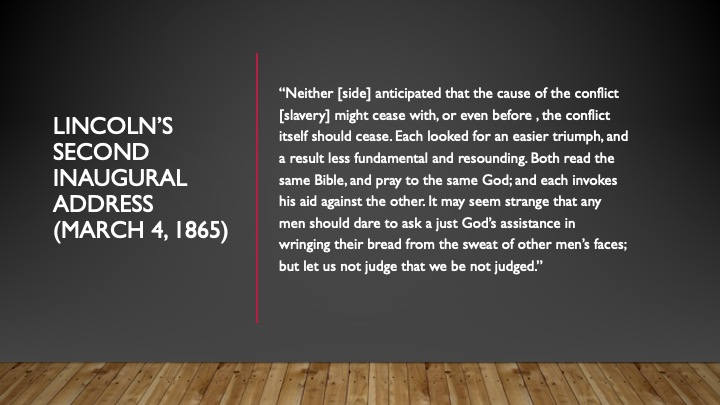
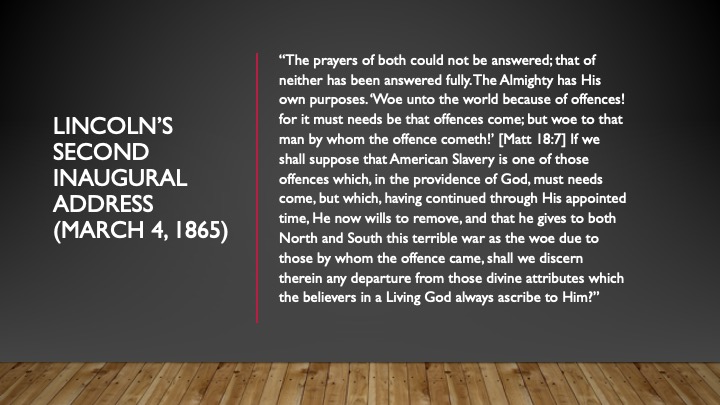
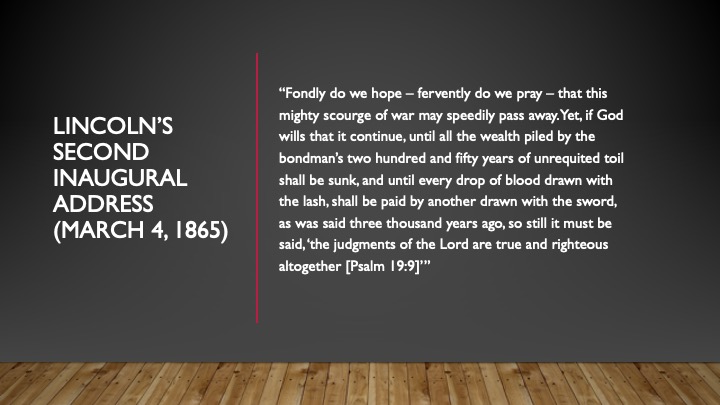
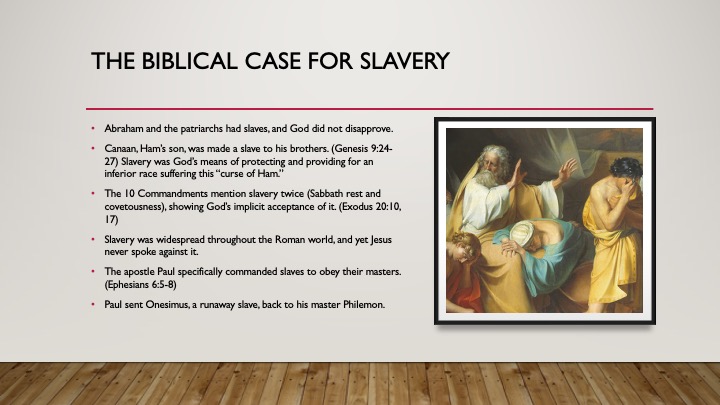
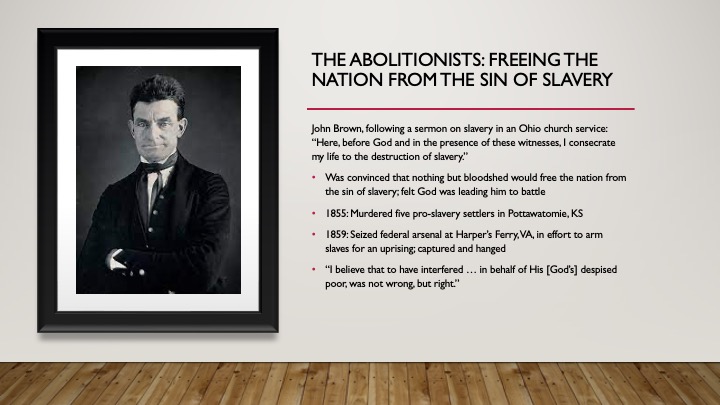
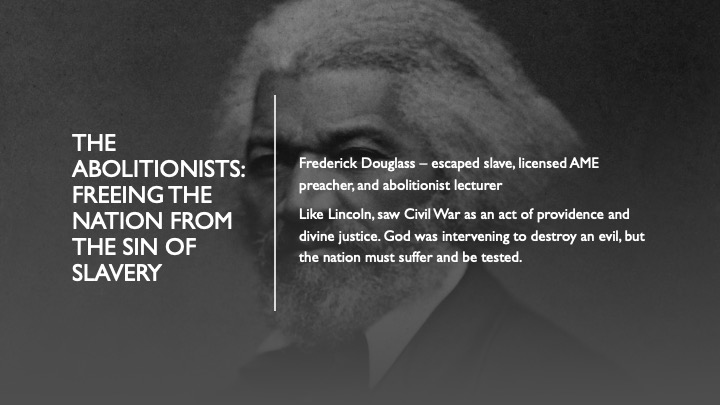
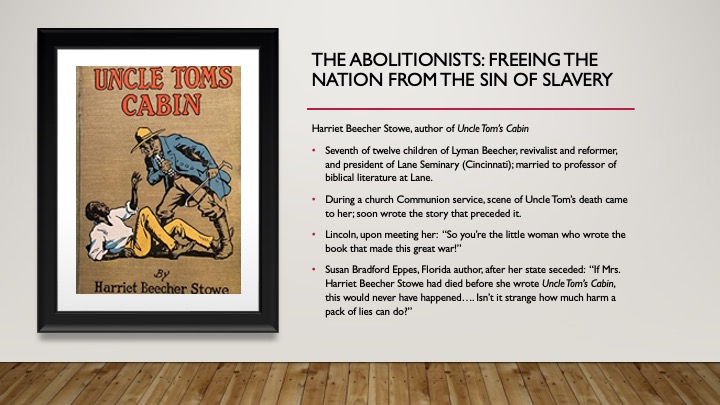
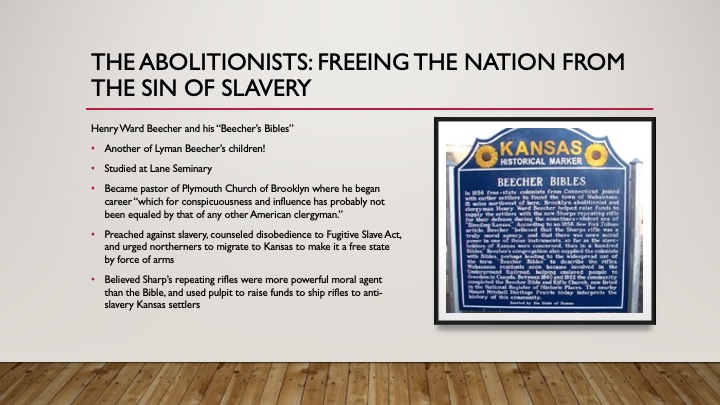
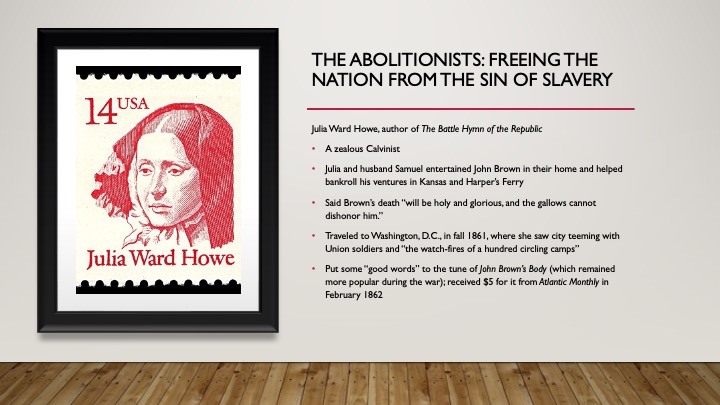
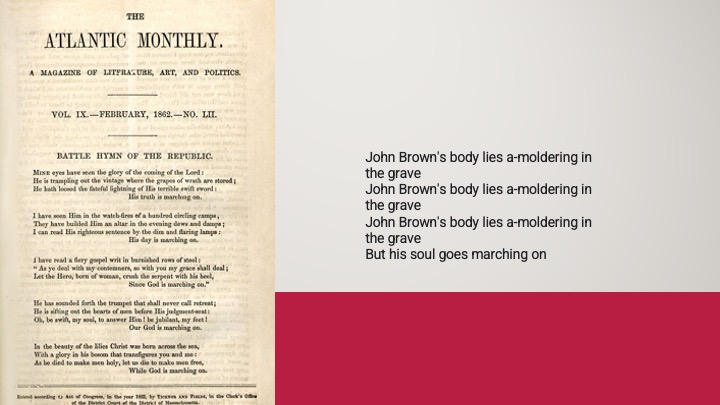
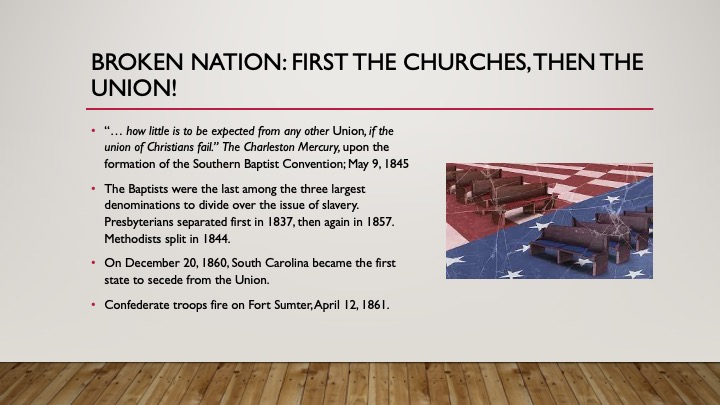
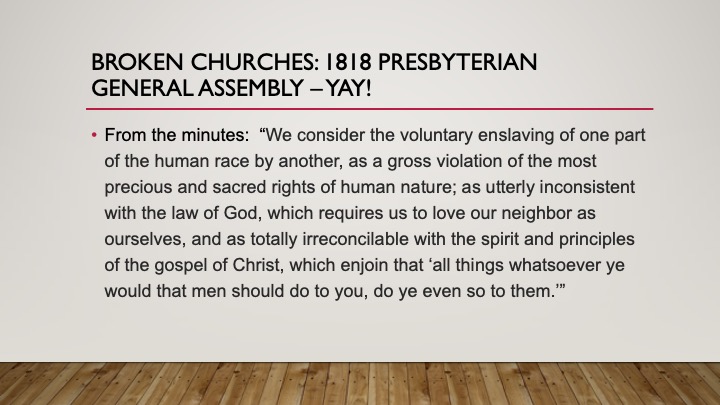
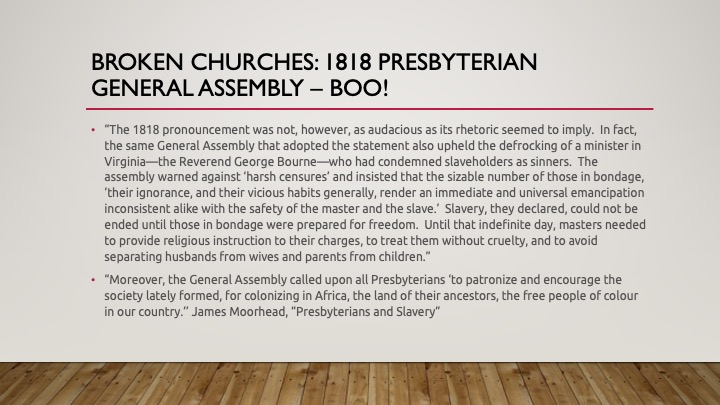
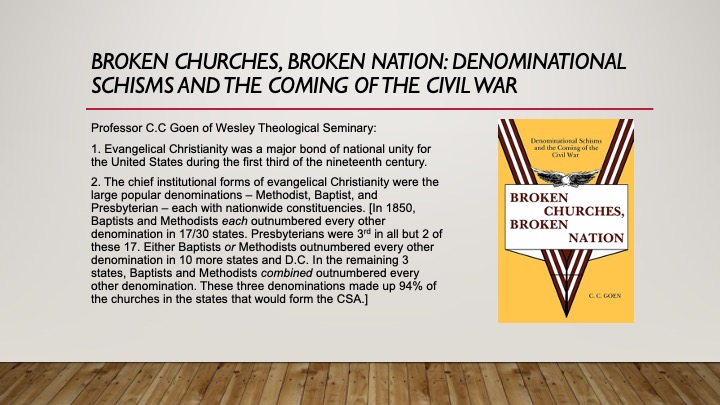
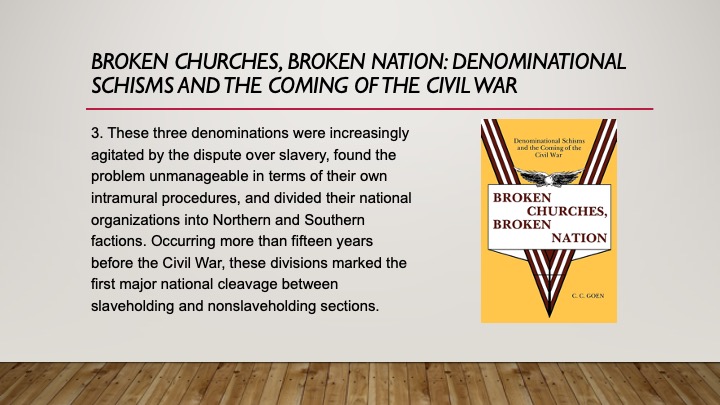
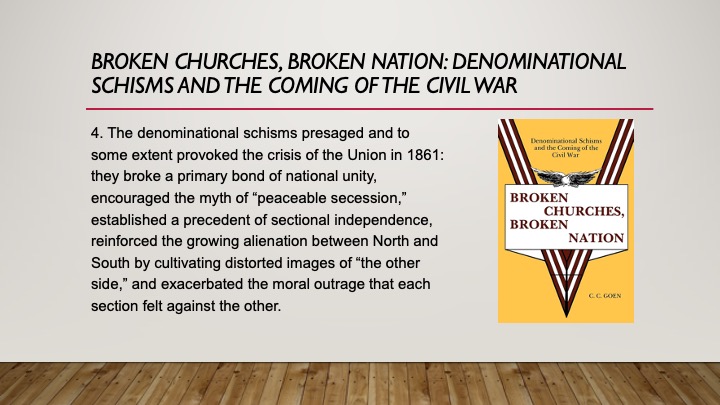
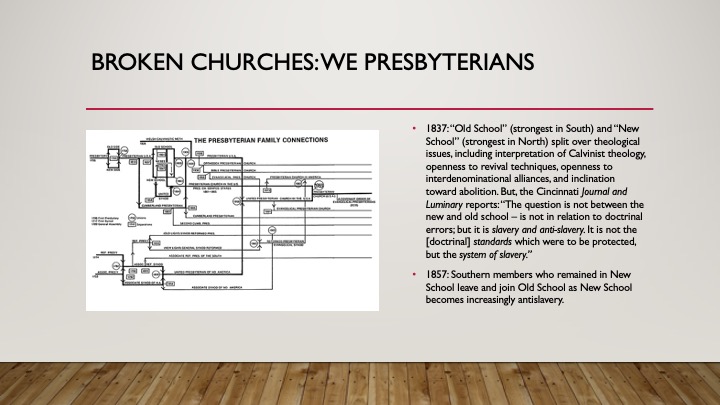
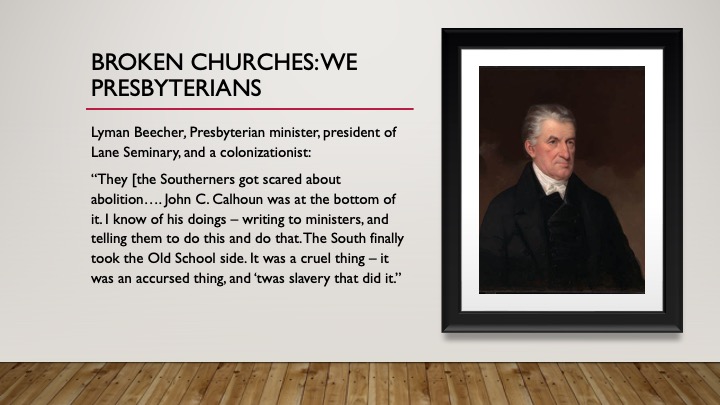
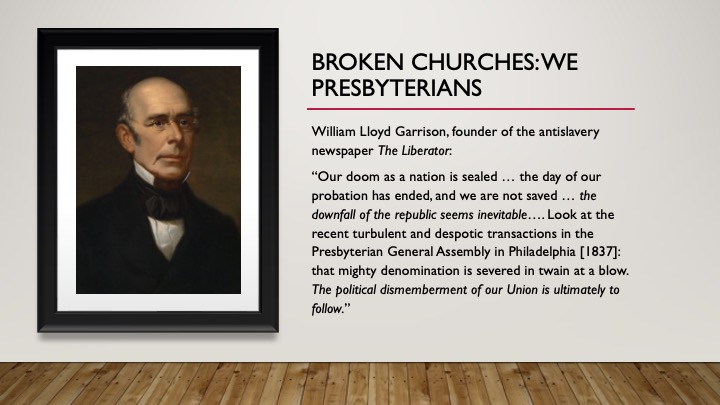
Christianity and the Civil War
Where was God? : Slavery, Broken churches, and Revivals
Where
was God?
With the South?
“Immediately as war approached , theologians turned instinctively to God as the one who would decide the outcome. In January 1861 James Henley Thornwell of South Carolina carefully laid out the constitutional case for secession in order to demonstrate that if armed struggle arose, it would be because of the North’s wrongdoing, not the South’s. His concluding word, however, was providential: ‘We prefer peace – but if war must come, we are prepared to meet it with unshaken confidence in the God of battles.’” Quoted from the Southern Presbyterian Review (founded by Thornwell, a Presbyterian preacher) in Mark Noll, The Civil War as Theological Crisis.
Where
was God?
With the North?
“I
charge the whole guilt of this war upon the ambitious, educated, plotting
leaders of the South…. A day will come when God will reveal judgment and
arraign these mighty miscreants…. And then these guiltiest and most remorseless
traitors … shall be whirled aloft and plunged downward forever and ever in an
endless retribution.” Henry Ward Beecher, pastor of Brooklyn’s Congregational
Church
Christianity and the Civil War
Abraham Lincoln
Can you find the differences in these constitutional preambles?
We the People of the United States, in Order to form a more perfect Union, establish Justice, insure domestic Tranquility, provide for the common defence, promote the general Welfare, and secure the Blessings of Liberty to ourselves and our Posterity, do ordain and establish this Constitution for the United States of America.
We, the people of the Confederate States, each State acting in its sovereign and independent character, in order to form a permanent federal government, establish justice, insure domestic tranquillity, and secure the blessings of liberty to ourselves and our posterity invoking the favor and guidance of Almighty God do ordain and establish this Constitution for the Confederate States of America.
Leave It To Lincoln to get it right
•Was never baptized
•Only president never to join a church
•But knew the Bible thoroughly
•Biographers James Randall and Richard Current: “a man of more intense religiosity than any other President the United States has ever had.”
•Faith was not conventional; “had no use for Christian creeds or statements of faith, and little use for formal theology.” Second Inaugural Address (March 1865) “stands as the most remarkably Christian public statement by any American president.” Mark Noll, The Puzzling Faith of Abraham Lincoln.
Lincoln's circular in response to Methodist preacher Peter Cartwright (1846)
•In Congressional election of 1846, rumor spread that Lincoln mocked Christianity and scoffed at religious practice. His political opponent was Cartwright.
•“That I am not a member of any Christian Church, is true; but I have never denied the truth of the Scriptures; and I have never spoken with intentional disrespect of religion in general, or of any denominations of Christians in particular…. I do not think I could, myself, be brought to support a man for office whom I knew to be an open enemy of, and scoffer at, religion. Leaving the higher matter of eternal consequences between him and his Maker, I still do not think any man has the right to insult the feelings, and injure the morals, of the community in which he may live….”
More Lincoln vs. Cartwright (1846)
•As told by Carl Sandburg in Abraham Lincoln: The Prairie Years: Lincoln attended one of Cartwright’s evangelistic rallies and was the only one who did not get up when all who wanted to go to heaven and did not wish to go to hell were invited to stand.
Cartwright: “May I inquire of you, Mr. Lincoln, where are you going?”
Lincoln: “I came here as a respectful listener. I did not know that I was to be singled out by Brother Cartwright. I believe in treating religious matters with due solemnity. I admit that the questions propounded by Brother Cartwright are of great importance. I did not feel called upon to answer as the rest did. Brother Cartwright asks where I am going. I desire to reply with equal directness: I am going to Congress.” He went.
Christianity And The Civil War
More Lincoln
Lincoln’s “Meditation on the Divine Will” (September 1862, Following Union Defeat at Second Bull Run)
“The will of God prevails. In great contests each party claims to act in accordance with the will of God. Both may be, and one must be, wrong. God can not be for and against the same thing at the same time. In the present civil war it is quite possible that God’s purpose is something different from the purpose of either party – and yet the human instrumentalities, working just as they do, are of the best adaptation to effect His purpose. I am almost ready to say that this is probably true – that God wills this contest, and wills that it should not end yet. By his mere quiet power, on the minds of the now contestants, He could either have saved or destroyed the Union without a human contest. Yet the contest began. And having begun He could give the final victory to either side any day. Yet the contest proceeds.”
Lincoln To a Group of Baltimore Freemen (September1864)
“In regard to this Great Book, I have but to say, it is the best gift God has given to man. All the good the Saviour gave to the world was communicated through this book. But for it we could not know right from wrong. All things most desirable for man’s welfare, here and hereafter, are to be found portrayed in it.”
Christianity And The Civil War
Lincoln's Second Inaugural Address
LINCOLN’S Second Inaugural Address (March 4, 1865)
“Neither [side] anticipated that the cause of the conflict [slavery] might cease with, or even before , the conflict itself should cease. Each looked for an easier triumph, and a result less fundamental and resounding. Both read the same Bible, and pray to the same God; and each invokes his aid against the other. It may seem strange that any men should dare to ask a just God’s assistance in wringing their bread from the sweat of other men’s faces; but let us not judge that we be not judged.”
“The prayers of both could not be answered; that of neither has been answered fully. The Almighty has His own purposes. ‘Woe unto the world because of offences! for it must needs be that offences come; but woe to that man by whom the offence cometh!’ [Matt 18:7] If we shall suppose that American Slavery is one of those offences which, in the providence of God, must needs come, but which, having continued through His appointed time, He now wills to remove, and that he gives to both North and South this terrible war as the woe due to those by whom the offence came, shall we discern therein any departure from those divine attributes which the believers in a Living God always ascribe to Him?”
“Fondly do we hope – fervently do we pray – that this mighty scourge of war may speedily pass away. Yet, if God wills that it continue, until all the wealth piled by the bondman’s two hundred and fifty years of unrequited toil shall be sunk, and until every drop of blood drawn with the lash, shall be paid by another drawn with the sword, as was said three thousand years ago, so still it must be said, ‘the judgments of the Lord are true and righteous altogether [Psalm 19:9]’”
Christianity And The Civil War
the Biblical case for Slavery
The Biblical Case for Slavery
•Abraham and the patriarchs had slaves, and God did not disapprove.
•Canaan, Ham’s son, was made a slave to his brothers. (Genesis 9:24-27) Slavery was God’s means of protecting and providing for an inferior race suffering this “curse of Ham.”
•The 10 Commandments mention slavery twice (Sabbath rest and covetousness), showing God’s implicit acceptance of it. (Exodus 20:10, 17)
•Slavery was widespread throughout the Roman world, and yet Jesus never spoke against it.
•The apostle Paul specifically commanded slaves to obey their masters. (Ephesians 6:5-8)
•Paul sent Onesimus, a runaway slave, back to his master Philemon.
Christianity And The Civil War
Freeing the Nation From the Sin of Slavery.
The Abolitionists: Freeing the Nation From the Sin of Slavery.
John Brown, following a sermon on slavery in an Ohio church service: “Here, before God and in the presence of these witnesses, I consecrate my life to the destruction of slavery.”
•Was convinced that nothing but bloodshed would free the nation from the sin of slavery; felt God was leading him to battle
•1855: Murdered five pro-slavery settlers in Pottawatomie, KS
•1859: Seized federal arsenal at Harper’s Ferry, VA, in effort to arm slaves for an uprising; captured and hanged
•“I believe that to have interfered … in behalf of His [God’s] despised poor, was not wrong, but right.”
Frederick Douglass
Frederick Douglass – escaped slave, licensed AME preacher, and abolitionist lecturer
Like Lincoln, saw Civil War as an act of providence and divine justice. God was intervening to destroy an evil, but the nation must suffer and be tested.
Harriet Beecher Stowe, author of Uncle Tom’s Cabin
•Seventh of twelve children of Lyman Beecher, revivalist and reformer, and president of Lane Seminary (Cincinnati); married to professor of biblical literature at Lane.
•During a church Communion service, scene of Uncle Tom’s death came to her; soon wrote the story that preceded it.
•Lincoln, upon meeting her: “So you’re the little woman who wrote the book that made this great war!”
•Susan Bradford Eppes, Florida author, after her state seceded: “If Mrs. Harriet Beecher Stowe had died before she wrote Uncle Tom’s Cabin, this would never have happened…. Isn’t it strange how much harm a pack of lies can do?”
Henry Ward Beecher and his “Beecher’s Bibles”
•Another of Lyman Beecher’s children!
•Studied at Lane Seminary
•Became pastor of Plymouth Church of Brooklyn where he began career “which for conspicuousness and influence has probably not been equaled by that of any other American clergyman.”
•Preached against slavery, counseled disobedience to Fugitive Slave Act, and urged northerners to migrate to Kansas to make it a free state by force of arms
•Believed Sharp’s repeating rifles were more powerful moral agent than the Bible, and used pulpit to raise funds to ship rifles to anti-slavery Kansas settlers
Julia Ward Howe, author of The Battle Hymn of the Republic
•A zealous Calvinist
•Julia and husband Samuel entertained John Brown in their home and helped bankroll his ventures in Kansas and Harper’s Ferry
•Said Brown’s death “will be holy and glorious, and the gallows cannot dishonor him.”
•Traveled to Washington, D.C., in fall 1861, where she saw city teeming with Union soldiers and “the watch-fires of a hundred circling camps”
•Put some “good words” to the tune of John Brown’s Body (which remained more popular during the war); received $5 for it from Atlantic Monthly in February 1862
John Brown's body lies
a-moldering in the grave
John
Brown's body lies a-moldering in the grave
John
Brown's body lies a-moldering in the grave
But
his soul goes marching on
Christianity and the Civil War
Broken Nation: First the Churches, Then the Union!
Broken Nation: First the Churches, Then the Union!
•“… how little is to be expected from any other Union, if the union of Christians fail.” The Charleston Mercury, upon the formation of the Southern Baptist Convention; May 9, 1845
•The Baptists were the last among the three largest denominations to divide over the issue of slavery. Presbyterians separated first in 1837, then again in 1857. Methodists split in 1844.
•On December 20, 1860, South Carolina became the first state to secede from the Union.
•Confederate troops fire on Fort Sumter, April 12, 1861.
Broken churches: 1818 Presbyterian General Assembly – Yay!
•From the minutes: “We consider the voluntary enslaving of one part of the human race by another, as a gross violation of the most precious and sacred rights of human nature; as utterly inconsistent with the law of God, which requires us to love our neighbor as ourselves, and as totally irreconcilable with the spirit and principles of the gospel of Christ, which enjoin that ‘all things whatsoever ye would that men should do to you, do ye even so to them.’”
Broken churches: 1818 Presbyterian General Assembly – Boo!
•“The 1818 pronouncement was not, however, as audacious as its rhetoric seemed to imply. In fact, the same General Assembly that adopted the statement also upheld the defrocking of a minister in Virginia—the Reverend George Bourne—who had condemned slaveholders as sinners. The assembly warned against ‘harsh censures’ and insisted that the sizable number of those in bondage, ‘their ignorance, and their vicious habits generally, render an immediate and universal emancipation inconsistent alike with the safety of the master and the slave.’ Slavery, they declared, could not be ended until those in bondage were prepared for freedom. Until that indefinite day, masters needed to provide religious instruction to their charges, to treat them without cruelty, and to avoid separating husbands from wives and parents from children.”
•“Moreover, the General Assembly called upon all Presbyterians ‘to patronize and encourage the society lately formed, for colonizing in Africa, the land of their ancestors, the free people of colour in our country.’’ James Moorhead, “Presbyterians and Slavery”
Christianity And The Civil War
Broken Churches, Broken Nation: Denominational Schisms and the Coming of the Civil War
Broken Churches, Broken Nation: Denominational Schisms and the Coming of the Civil War
Professor C.C Goen of Wesley Theological Seminary:
1. Evangelical Christianity was a major bond of national unity for the United States during the first third of the nineteenth century.
2. The chief institutional forms of evangelical Christianity were the large popular denominations – Methodist, Baptist, and Presbyterian – each with nationwide constituencies. [In 1850, Baptists and Methodists each outnumbered every other denomination in 17/30 states. Presbyterians were 3rd in all but 2 of these 17. Either Baptists or Methodists outnumbered every other denomination in 10 more states and D.C. In the remaining 3 states, Baptists and Methodists combined outnumbered every other denomination. These three denominations made up 94% of the churches in the states that would form the CSA.]
3. These three denominations were increasingly agitated by the dispute over slavery, found the problem unmanageable in terms of their own intramural procedures, and divided their national organizations into Northern and Southern factions. Occurring more than fifteen years before the Civil War, these divisions marked the first major national cleavage between slaveholding and nonslaveholding sections.
4. The denominational schisms presaged and to some extent provoked the crisis of the Union in 1861: they broke a primary bond of national unity, encouraged the myth of “peaceable secession,” established a precedent of sectional independence, reinforced the growing alienation between North and South by cultivating distorted images of “the other side,” and exacerbated the moral outrage that each section felt against the other.
Christianity and the Civil War
Broken Churches: We Presbyterians
Broken Churches: We Presbyterians
•1837: “Old School” (strongest in South) and “New School” (strongest in North) split over theological issues, including interpretation of Calvinist theology, openness to revival techniques, openness to interdenominational alliances, and inclination toward abolition. But, the Cincinnati Journal and Luminary reports: “The question is not between the new and old school – is not in relation to doctrinal errors; but it is slavery and anti-slavery. It is not the [doctrinal] standards which were to be protected, but the system of slavery.”
•1857: Southern members who remained in New School leave and join Old School as New School becomes increasingly anti-slavery.
Lyman Beecher, Presbyterian minister, president of Lane Seminary, and a colonizationist:
“They [the Southerners got scared about abolition…. John C. Calhoun was at the bottom of it. I know of his doings – writing to ministers, and telling them to do this and do that. The South finally took the Old School side. It was a cruel thing – it was an accursed thing, and ‘twas slavery that did it.”
William Lloyd Garrison, Founder of the Antislavery Newspaper The Liberator:
“Our doom as a nation is sealed … the day of our probation has ended, and we are not saved … the downfall of the republic seems inevitable…. Look at the recent turbulent and despotic transactions in the Presbyterian General Assembly in Philadelphia [1837]: that mighty denomination is severed in twain at a blow. The political dismemberment of our Union is ultimately to follow.”